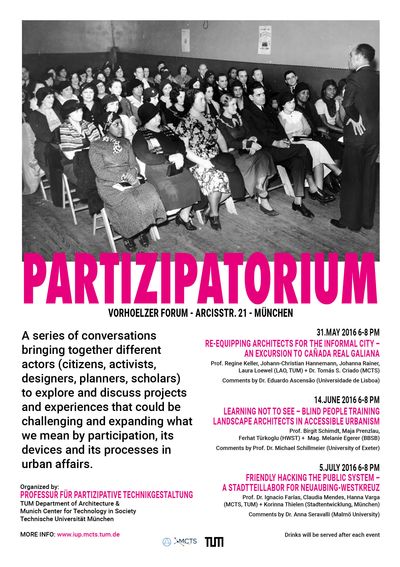PARTIZIPATORIUM Series

In this cycle of PARTIZIPATORIUM, we will explore a simple hypothesis: democratization of technical decision making does not simply require citizens or lay people to become experts. More importantly, it needs professional experts in the private and public sector to become aware of the limits of their own expertise, to open themselves to other forms of sensing, knowing and valuing and ultimately, why not, to be trained differently.
All sessions take place at the Vorhoelzer Forum.
05.07.2016 - PARTIZIPATORIUM #3: Friendly hacking the public system – A Statdtteillabor for Neuaubing-Westkreuz
Tuesday 5th of July in this final session of the first cycle of the Partizipatorium Prof. Dr. Ignacio Farías, Claudia Mendes, Hanna Varga (MCTS, TUM), together with Korinna Thielen (Stadtentwicklung, München) and with comments and discussion by Dr. Anna Seravalli (Malmö University), we will be exploring how co-design projects might not only require a transformation of the relations between designers and potential end users, but also –and especially in projects involving the public administration– between different types of experts.
In this session we will be exploring the aspirations, hopes and understandings of co-design in and around the construction of the Stadtteillabor for Neuaubing-Westkreuz, part of the bigger project "Stadtteil-Labor 'Gemeinsam Gegenwart Gestalten'. Smarter Together: Smart and Inclusive Solutions for a Better Life in Urban Districts". For this, we will inquire: what if conceiving and implementing processes of co-design of this kind also entailed forms of friendly hacking the public system?
14.06.2016 - #2: Sensitizing to blindness - Training architects in accessible urbanism
[DE] Am kommenden Dienstag, den 14.6. um 18 Uhr, werden wir uns im Vorhoelzer Forum der Frage widmen, wie ArchitektInnen und StädteplanerInnen für eine barrierefreie Stadt sensibilisiert und trainiert werden können. Unsere Gäste sind: Prof. Birgit Schmidt (Objektplanung in der Landschaftsarchitektur, Hochschule Weihenstephan-Triesdorf) Maja Prenzlau & Ferhat Türkoglu (Studierende der Landschaftsarchitektur, HSWT) Melanie Egerer (Bayerischer Blinden- und Sehbehindertenbund – BBSB) Prof. Dr. Michael Schillmeier (University of Exeter) Im Zentrum der Veranstaltung wird die Zusammenarbeit zwischen sehenden Landschaftsarchitekten der HSWT und nicht sehenden Experten in eigener Sache vom BBSB stehen. Ziel dieser Kooperation war es, Studierende der Landschaftsarchitektur darin zu trainieren, Probleme der barrierefreien Gestaltung öffentlicher Räume zu identifizieren und aufzuzeigen. Im Anschluss möchten wir mit Ihnen und weiteren Interessierten über die breitere Bedeutung dieses Falls für Partizipation reflektieren.
[EN] On Tuesday June 14th together with Prof. Birgit Schimdt's Objektplanung in der Landschaftsarchitektur (Hochschule Weihenstephan-Triesdorf), her students Maja Prenzlau & Ferhat Türkoglu, Melanie Egerer from the Bayerischer Blinden- und Sehbehindertenbund (BBSB) and with comments by Prof. Dr. Michael Schillmeier (University of Exeter) we will be exploring the devices, gadgets, activities and practices needed to 'sensitize' students of Landscape Architecture to become assistants in the political work of the BBSB's associates to foreground problems in the design of accessible public spaces. We would like to understand the role played by these gadgets in learning what it means 'not to see', paying special attention to how lived and embodied experience is translated or worked out in these processes, and how sensitization might be crucial to democratize and to make urbanism more accessible.
31.05.2016 - #1: Re-Equipping Architects for the Informal City
On May 31st at 6pm, together with Prof. Regine Keller's (LAO, TUM) group and Dr. Eduardo Ascensão (Universidade de Lisboa), we have been reflecting on a Master's in Landscape Architecture course on the design of alternative public spaces for a particular informal settlement: La Cañada Real Galiana, in Madrid.
In many projects of 'slum upgrading' technical professionals tend to call for the participation of local dwellers as a way to validate or discuss the prospects of their proposals. But this could also become an extremely top-down approach to the problems at hand. Hence, what if we thought of participation as something that involved a radical transformation of the technical professionals themselves? What if they needed to be 're-equipped' to become sensitive to the needs of the local dwellers and to the constraints of the spaces in which they will operate?
For this, in this session, we shared and discussed a teaching experiment undertaken between Regine Keller's LAO and MCTS's Participatory Technology Design research groups at TUM: a field trip where Landscape Architects where speed-trained as social scientists, taking field-notes shadowing the local dwellers, using picture-based methods to elicit conversations with them, and reflecting on the involvement with them writing up comprehensive diaries. After presenting this experience, we sought to explore whether 're-equipping the technical professionals' could be considered a necessary condition to redefine participation in urban affairs.